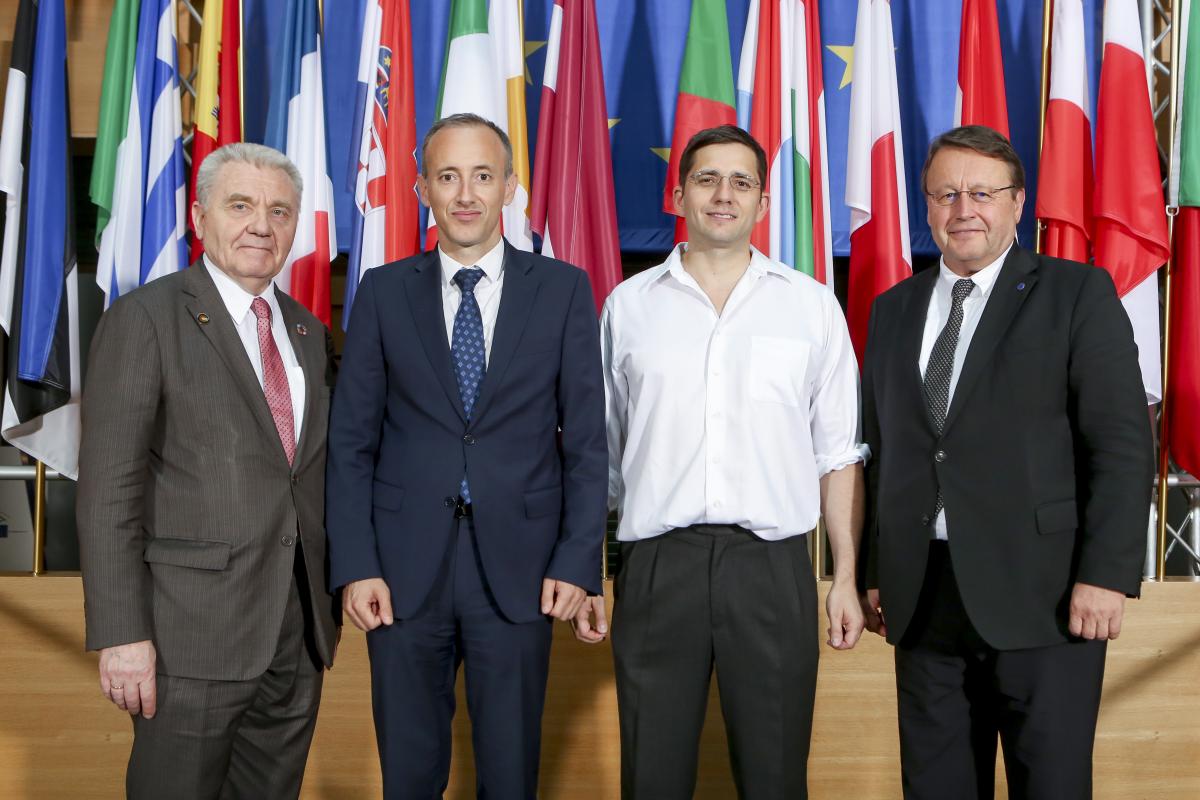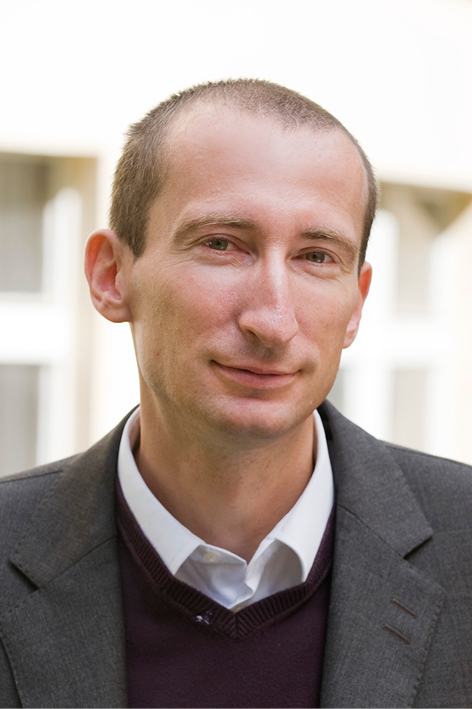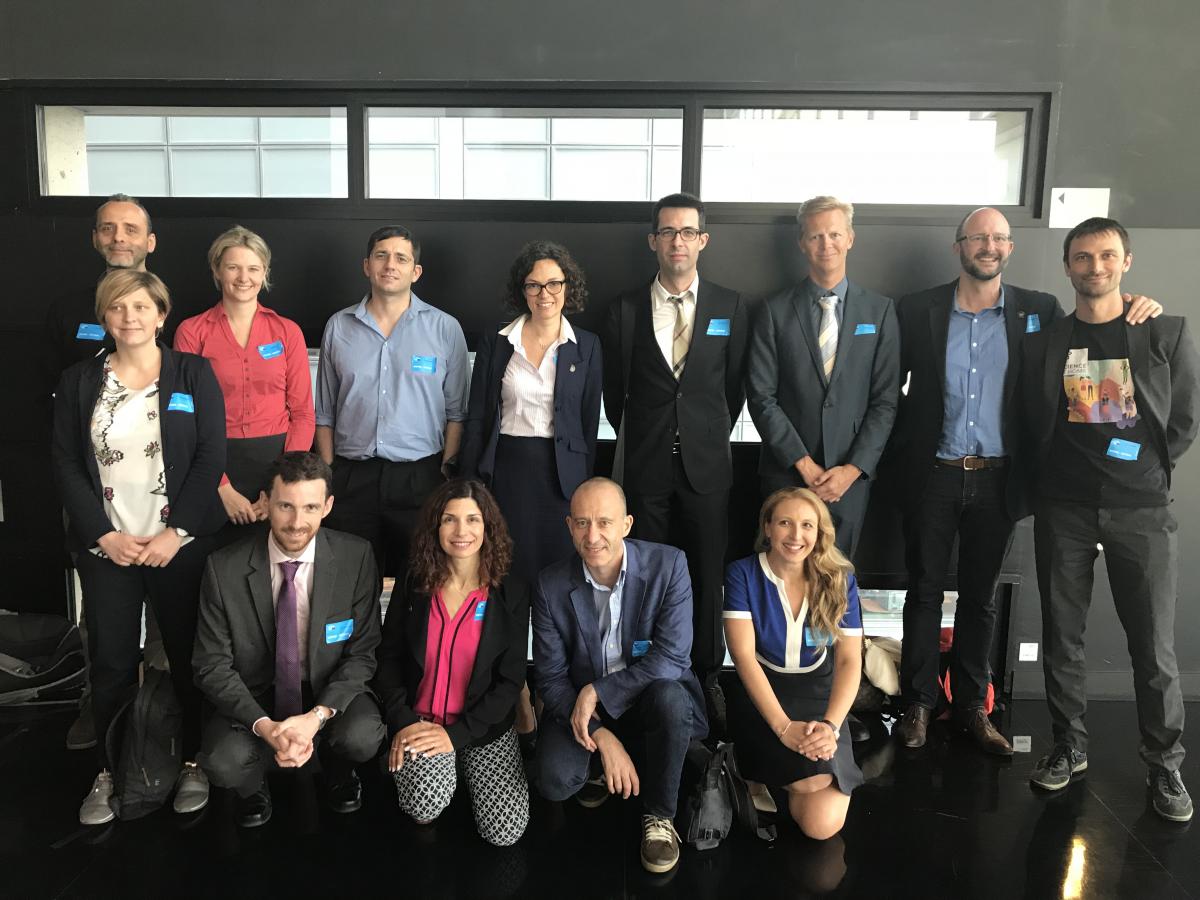Spotlight on Scientists at the European Parliament

On 31 May the European Parliament and the ERC shone a spotlight on European scientific talent at an event in Strasbourg. The event fostered discussion between politicians and academics, in an attempt to address tomorrow’s challenges.
The two day event, titled "Investing in young researchers, shaping Europe’s future", was organised by the ERC and the European Parliament's Science and Technologies Option Assessment Committee (STOA). Both groups have a unique perspective when it comes to the innovations and technologies that will change the way we live. What they don't often have is a platform for exchange between scientists and policymakers. "The strong, long-term support of political institutions makes all the difference in the career of researchers" stressed Prof. Jean-Pierre Bourguignon, President of the ERC.
During the course of the event, several workshops attended by ERC grantees and Members of the European Parliament investigated topical issues such as modern energy solutions, eco-efficient transport, sustainable management of natural resources, the digital revolution and health and science diplomacy. ERC Magazine reports on two of these sessions: Digital revolution – Potential and challenges of the Information Society and Science policy, communication and global networking.

Digital revolution: Potential and challenges of the Information Society
Powerful and ultrafast computer programmes are increasingly taking over data management, data analysis and decision-making. To what extent is this shaping the world we live in? What potential benefits, and what potential pitfalls, do we need to learn to look out for in today's digital revolution? To answer these questions, MEPs and ERC grantees came together to discuss topics such as artificial intelligence, big data, algorithms, machine learning and robotics.
"Most of the topics that will be discussed today were already being discussed twenty years ago" started ERC Scientific Council Member Andrsej Jajszczyk "so why are they so important today"? The huge increase in computing power combined with the generation of enormous quantities of data are transforming the worlds of work, politics and diplomacy.
Doubts about whether we are in control of this process seem to be on everyone's mind.
Prof. Nello Cristianini, AI Professor at the University of Bristol, was cautiously optimistic that the digital revolution will not have an adverse effect on employment. "There is no law stating that other jobs will be created" by new technologies, so governments and business will need to work together to safeguard jobs and create new opportunities. He stressed the need for appropriate regulation, for example in data protection, such as the new General Data Protection Regulation (GDPR).
Prof. Panayiota Poirazi, Director of Research at the Institute of Molecular Biology and Biotechnology, at FORTH, expressed concerns over the speed at which these technologies are developing and the control humans have over them. She emphasised that most of the research currently undertaken in the field is conducted by the private sector, and that the public sector needs to play an active role in order to ensure that new technologies serve the public interest.

This is particularly true in fields such as medicine – a topic that was also reinforced by Prof. František Štěpánek, from the University of Chemistry and Technology in Prague.
Prof. Martin Vechev Professor of Computer Science at ETH Zurich also highlighted the role of policymakers, in particular in two aspects of the digital revolution: transparency and education. The former must be guaranteed by regulation to foster the trust of citizens, the latter being pivotal if the roles of many people in society change as a result of machines.
MEPs were open to the scientists' recommendations, and also recognised the important role that political institutions will play in exploiting these technologies. MEP Algirdas Saudargas stated that the danger of these innovations is linked with the interests of the people behind them, and that it's up to policymakers to protect society against negative interests.
"These technological developments are not going to wait for us and we must be proactive," concluded MEP Claire Moody. "But with caution and open communication." Institutions like the ERC and the European Parliament must work together to both develop and understand digital technologies, and find transparent, reliable and secure regulations to help these technologies harmonise with society.

Science policy, communication and global networking
In an era of declarations of 'fake-news' and ' post-truth', can scientific facts still appeal to society at large? Do people beyond the scientific community still trust science, use it to help make decisions, and understand the world around them?
Scientific development is changing our lifestyle at a speed never seen before and citizens' fears about the implications of new technologies must be addressed by scientists. At the same time, ordinary people are also increasingly participating in the scientific sphere, through "citizen science". The way the scientific world interacts with society is clearly undergoing a profound change. How then should the scientific community engage citizens?
This session brought together MEPs Anthea McIntyre and Isabelle Thomas, the European Commission's Director General for Science Research and Innovation Jean-Eric Paquet, and Rolf Hauer, Chair of the Commission's Group of Chief Scientific Advisors. The discussion focused on how the research world can interact with society, and several ERC grantees provided concrete examples.
Questioning and critical thinking from the general public should be fostered, as opposed to a one-way communication system that does not nurture trust in scientific evidence.
Prof. Jacob Sherson, of the Department of Physics at Aarhus University, leads a team of scientists and engineers that develop entertaining videogames for citizens to solve quantum mechanics problems. Manuel Franco Tejero, Associate Professor at University of Alcalá in Madrid investigates the relationship between heart health and where you live, and often communicates as widely as possibly to citizens about his research using emotive photography.
Other participants talked about their experiences studying the phenomenon of citizen engagement to try and understand how to foster good practices in science communication. Sophie Marien, Assistant Professor in Comparative and Historical Political Science at the University of Leuven, investigates citizen assemblies connected to important referenda. Prof. Agnieska Wykowska at the Italian Institute of Technology in Genoa works with caregivers such as parents, involving them in research on robotic applications in the field of health, in particular for autistic children. Professor of Sociology at the University of Warwick Alice Mah focuses on so-called "citizen-expert" alliances on divisive issues such as pollution from toxic substances.
Projects like these are important for breaking the perceived wall between science and society, especially at a time when issues of complex scientific nature, such as data exploitation, are constantly being debated. The roles of regulation and political institutions are key, especially when dealing with private companies that handle ever larger quantities of personal information.
The debate also touched on the image that scientists and research professionals have in the public imagination, and the importance of breaking the perceived barrier between science and society. MEP Anthea McInthyre, for example, talked about how the perception of science has changed for farmers, who, now more than ever, can take advantage of incredibly sensitive technologies to improve crop production.
For this positive view to enter the general public sphere, it is fundamental to invest in science communication and in understanding how to reach different audiences using different languages and media. In his closing remarks, Martin Stokhof, Vice-President of the ERC's Scientific Council concluded that, if we want to be serious about engaging citizens with science, these practices have to be included and valued in the work of scientists from the very start, and be encouraged and facilitated by policymakers.

